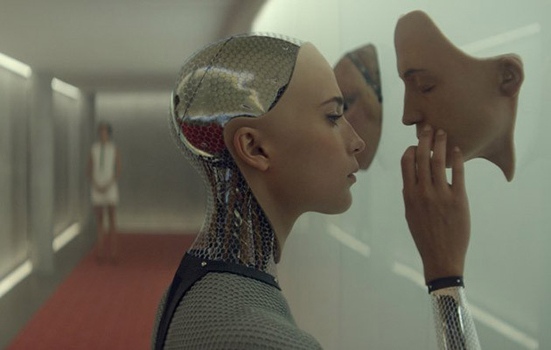Written/Directed by: Alex Garland
Cast: Alicia Vikander, Domhnall Gleeson, Oscar Isaac
Robocop. The Terminator. Bicentennial Man. A.I. All of these have one thing in common: human-like artificial intelligence. It used to be purely science fiction to see robots almost completely indiscernible from their human counterparts, but as each day ends, we are that much closer to that science fiction becoming an absolute reality.
Ex Machina explores this almost certain future in a dark, twisted fashion. With a limited cast, captivating dialogue and breathtaking scenery, you can’t help but be completely enveloped in the unfolding drama.
Caleb (Domhnall Gleeson: Unbroken, About Time), a young, intelligent computer programmer is selected by his reclusive employer Nathan (Oscar Isaac: Inside Llewyn Davis) to perform a highly advanced test on his latest AI creation. Nathan created the code for BlueBook, the world’s top search engine, when he was just 13. As an adult, his knowledge and ability to program know no bounds.
Caleb is whisked away to a remote location, tucked away in an evergreen forest surrounded by rivers, lakes, mountains, and glaciers. Nathan’s home is secured and decorated by top of the line technology. Even the helicopter that drops Caleb off can’t approach the compound too close. It is the perfect place for a genius to whittle away at his advanced designs, free from interruption or fear of stolen information.
Nathan is looking for someone to perform the Turing test. The Turing test was created to test a machine’s ability to exhibit human-like behavior in such a way that it is indistinguishable from humans. The human interrogator is usually hidden from two responders, one of which is human, and the other being a computer. It is up to the interrogator to determine which of the two is the computer.
Caleb’s challenge was much different. He is introduced to Ava (Alicia Vikander), Nathan’s latest creation, and converses with her face to face with a glass barrier between them. Nathan’s task for Caleb is to see beyond the fact that clearly Ava is a machine. Her face, hands, and feet are the only parts of her that look relatively human; the rest of her body, while shaped like a human, is transparent, showing her inner mechanics.
Ava and Caleb meet every day, asking questions of each other and building a relationship. Trust begins to form between the two of them, making Caleb question the trust he has placed in Nathan. Slowly but surely, emotions entangle and intentions are questioned; not just Nathan’s, but Ava’s and Caleb’s as well. There is no other option but to wait anxiously for the next interaction, the next deception, the next twist in this already twisted plot.
With such a limited cast, you rely entirely on the relationships built and destroyed between the three main characters. Oscar Isaac is brilliant as the tormented genius; he knows he is in all likelihood the most brilliant man on the planet, on the cusp of an enormous historical event for mankind. He knows what he is doing is an inevitable consequence of the way our technology is advancing, and knows that the obsolescence of mankind is an inevitable consequence of artificial intelligence.
Domhnall Gleeson perfectly articulates a lonesome intellectual, swayed easily by emotions or a pretty face. His determination is limitless. Alicia Vikander is a glorious, child-like artificial human. Each interaction Ava has with Caleb, she delves deeper into realistic human emotion; but are her emotions genuine? Isn’t it a defining attribute of human behavior to be so adept at deception that it is almost unrecognizable? Aren’t we masters of manipulation, preying on perceived weaknesses to get exactly what we want?
The term deus ex machina is a literary device literally meaning “god from the machine.” It is used as a device to solve a problem in which there seems to be no solution; an event, an ability, or an object that appears out of nowhere, as if granted by God himself. It is as if Nathan himself is attempting to become this solution to the world’s problems, becoming a god by creating this machine.
Ex Machina is so insanely captivating, through visuals, dialogue, and twisted intentions. It leaves you wondering if we should quit while we’re ahead. There are benefits to AI: almost all of us carry it in our pockets in the form of Siri or Cortana. It helps us find our way, research an answer in seconds, or find out what song is playing on the radio. It can read our sleep patterns, calculate our heart beat, track our every step. But even the best of inventions always have unintended consequences.




